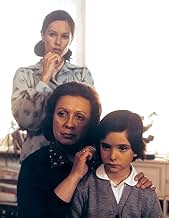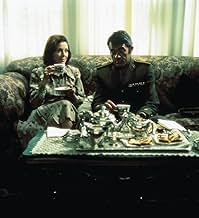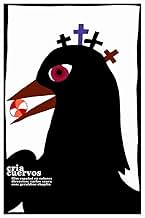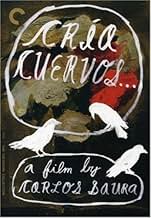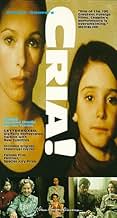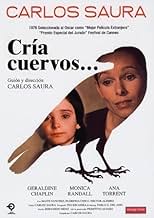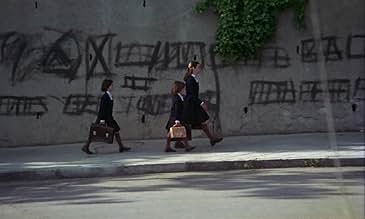NOTE IMDb
7,9/10
12 k
MA NOTE
Trois soeurs orphelines sous la tutelle de leur tante sévère et de leur grand-mère handicapée devront s'habituer à la nouvelle donne de leur vie commune, surmonter les obstacles perpétuels d... Tout lireTrois soeurs orphelines sous la tutelle de leur tante sévère et de leur grand-mère handicapée devront s'habituer à la nouvelle donne de leur vie commune, surmonter les obstacles perpétuels de la vie et, en même temps, grandir.Trois soeurs orphelines sous la tutelle de leur tante sévère et de leur grand-mère handicapée devront s'habituer à la nouvelle donne de leur vie commune, surmonter les obstacles perpétuels de la vie et, en même temps, grandir.
- Récompenses
- 8 victoires et 4 nominations au total
Conchita Pérez
- Irene
- (as Conchi Perez)
Mayte Sanchez
- Maite
- (as Maite Sánchez)
Mónica Randall
- Paulina
- (as Monica Randall)
Josefina Díaz
- Abuela
- (as Josefina Diaz)
Germán Cobos
- Nicolás Garontes
- (as German Cobos)
Héctor Alterio
- Anselmo
- (as Hector Alterio)
Julieta Serrano
- Ana
- (voix)
Avis à la une
10zetes
A perfect sister film to one of my absolute favorites, Spirit of the Beehive. It also stars Ana Torrent and has similar themes. And I like it probably as much. Torrent, three years older but looking pretty much the same, plays the middle child of three girls. At the beginning of the film, their father has just died. Their mother (played by Geraldine Chaplin) died a while back. The film is told through the mind of Ana, who is still mourning her mother, and she often sees her. It can be confusing at the beginning. Chaplin also appears as the adult Ana, who narrates some of her thoughts, or possibly as what Ana believes she will become. This is very ambiguous. The girls' aunt Paulina is now taking care of them. The duty was kind of forced upon her and, while she's trying her hardest, it's taking its toll. She's stern and not well liked by the girls, especially Ana. There isn't much plot, per se, and what little there is shouldn't be ruined. We often see Ana's imagination and memories come to life. We see her witness fights between her parents. Later on, she reenacts them with her sisters. The film is about what children observe, how they interpret it and how they act on those interpretations. The film also has political ramifications, subtle ones that are pretty difficult to grasp. The title is the beginning of a Spanish proverb that goes: "Raise ravens, and they'll tear out your eyes." Like Spirit of the Beehive, the film depicts a child experimenting with her own cruelty and violence. Supposedly this is all a criticism of the Fascist government (Franco had just died by this point, so his regime was just on its way out). It's a very dense and fascinating movie. You'd probably still be swimming through its mysteries on a hundredth viewing. If you thought possibly that Ana Torrent was not acting in Spirit of the Beehive, this will set you straight. Her blank, soulful expression is here in full force, of course, but here you see the slightest smile creep across her face, and you can just tell exactly what she's thinking. I'm afraid I've done an awful job reviewing Cría Cuervos. I haven't expressed how touching it is when dealing with Ana's loneliness (there's a scene where she dreams that her mother pops into her bedroom to tell her a story that's just heartbreaking), or how it often straddles dark comedy, like the scenes between Ana and the maid. I think that difficulty in reviewing it shows just how layered and confounding the film is. It shoots right up my favorites list. It's easily the best film I've seen all year. Bravo to Criterion for bringing this one to DVD. Hope they also get to Saura's La Caza sometime in the future.
I took this film in a video library and watched it 3 times. It is one of the most powerful films I have ever seen. The techniques in the film are very modest but it's amazing what the director does with them. I liked very much this sad and quiet girl. The scene where her pet dies and she buries him is so solemn and heart-breaking. I felt sad about the old Grandmother who watches the old pictures in sadness. I also liked Geraldine Chaplin, she is very good in this role, her intimate bond with the daughter, and how she looks at Ana with sadness when the girl doesn't notice it. The scene where the girl imagines her mom combing her hair is mesmerizing. Maria's pain is very palpable.
By the way I found some interesting information about this film. Geraldine Chaplin was dubbed in the episodes where she plays the grown Ana. It was done because the actress has a slight British accent which is not annoying or too prominent (for me at least), but the point is that she plays a grown girl, and it would be rather weird if a grown person acquires an accent in one's mother tongue if this accent did not exist during the childhood. So it was an intelligent consideration of the director.
I recommend this movie very much.
By the way I found some interesting information about this film. Geraldine Chaplin was dubbed in the episodes where she plays the grown Ana. It was done because the actress has a slight British accent which is not annoying or too prominent (for me at least), but the point is that she plays a grown girl, and it would be rather weird if a grown person acquires an accent in one's mother tongue if this accent did not exist during the childhood. So it was an intelligent consideration of the director.
I recommend this movie very much.
I have seen several thousand films in my life and this one became the top one almost instantly. Ever since I have watched it several times and it has never failed to impress and delight me - it even increases the sense of mystery undelying in its baroque and compelling history. On my opinion, it is Carlos Saura's masterpiece and perhaps the best film ever made about the mysterious inner world children live in and create. There is so much to be enjoyed in this film, that a conventional review will not make it justice.
In Madrid, the orphan sisters Irene (Conchota Pérez), Ana (Ana Torrent) and Maite (Maite Sánchez) are raised by their austere aunt Paulina (Mônica Randall) together with their mute and crippled grandmother after the death of their mother (Geraldine Chaplin) and their military father Anselmo (Héctor Alterio). Ana is a melancholic girl, fascinated by death, after seeing her mother having a painful death and her father dead in bed.
"Cria Cuervos" is a beautiful and sad movie of Carlos Saura that can be watched in two levels: in the first plane, it is a film that recalls the style of the family dramas of Ingmar Bergman. However, in a deeper level, the story is actually a metaphor of the recent Spanish political history, and each character represents a segment of their society: Ana's father represents the military dictatorship of Franco; her dying mother, the republic; her grandmother, those who miss the republic; Ana is probably the youth with a sad childhood surrounded by deaths. The conclusion is a message of hope for the people. I believe that those familiarized with the Spanish history would find many other elements, but in both levels this movie is wonderful. The title is a reference to the Spanish proverb "Cría cuervos y te sacaran los ojos" which means "Raise the ravens, and they will remove your eyes". Ana Torrent shows her amazing talent in the beginning of her successful career. My vote is eight.
Title (Brazil): "Cría Cuervos " ("Raise Ravens ")
"Cria Cuervos" is a beautiful and sad movie of Carlos Saura that can be watched in two levels: in the first plane, it is a film that recalls the style of the family dramas of Ingmar Bergman. However, in a deeper level, the story is actually a metaphor of the recent Spanish political history, and each character represents a segment of their society: Ana's father represents the military dictatorship of Franco; her dying mother, the republic; her grandmother, those who miss the republic; Ana is probably the youth with a sad childhood surrounded by deaths. The conclusion is a message of hope for the people. I believe that those familiarized with the Spanish history would find many other elements, but in both levels this movie is wonderful. The title is a reference to the Spanish proverb "Cría cuervos y te sacaran los ojos" which means "Raise the ravens, and they will remove your eyes". Ana Torrent shows her amazing talent in the beginning of her successful career. My vote is eight.
Title (Brazil): "Cría Cuervos " ("Raise Ravens ")
Ana (Ana Torrent), a sad-eyed little girl of about eight years old, unable to sleep, overhears a conversation as she walks down the stairs to get a glass of water. The voices, coming from her father Anslemo's (Hector Alterio), room, are exchanging expressions of mutual love. Ana hears the gasp of a man's voice crying that he is suffocating and then silence. A woman that she recognizes as Amelia (Mirta Miller), the wife of army officer Nicolás (Germán Cobos), her father's best friend, hurriedly leaves the room and heads for the front door, her blouse still unbuttoned. When the girl goes into her father's room, he is dead. She calmly takes the almost-emptied glass of milk next to his bed and washes it in the sink, then carefully puts it back on the kitchen rack.
It's title derived from the Spanish proverb "Raise ravens and they'll take your eyes," Carlo's Saura's haunting Cria Cuervos is a masterful insight into the mind of a little girl traumatized by the death of both of her parents. We see events from Ana's perspective and its fragmented view of an imaginative but angry and resentful child is a mixture of fantasy and reality that is often hard to separate. The film is also seen by some as an allegory for the mindset of the dying days of the Franco dictatorship. Whether it is viewed as a political statement or not, Cria Cuervos' evocation of the painful memories of a child whose grasp on reality is fading is masterful and deeply moving, especially given Ana Torrent's heartfelt and authentic performance.
Ana is one of three sisters. The older one is Irene (Conchita Pérez) and the younger one is Maite (Maite Sanchez). The little girl has visions of her mother talking to her, giving her advice about staying up too late, and reading stories to her in bed. Ana deeply longs for her mother (Geraldine Chaplin) who died of a painful illness before her father passed away. In voice-over we hear the adult Ana (also played somewhat confusingly by Geraldine Chaplin) recalling her memories from childhood and she has little good to say about them, saying that she remembers it being "interminably long and sad, full of fear." The children are now under the care and protection of their Aunt Paulina (Mónica Randall), who lacks warmth and affinity, and some have compared her haughty nature to the authoritarianism of the Franco government.
As a result, the children are much closer to Rosa, the family maid, who talks to them about family secrets even though much of what she says goes over their head. Also living with them in their country estate is the girls' grandmother, disabled and unable to speak who loves to look at family pictures on the wall, trying to recapture her fading memories of the past. The girls play at being adults. Irene puts on her aunt's bra and does her lashes. Pretending to be her father, Irene draws a moustache on her face while Maite wears high heels. Ana puts on lipstick as they act out their version of memories recalled from the many arguments they heard between their unfaithful father and their depressed and anxious mother.
The motif of death runs throughout the film. Ana believes she poisoned her father and fantasizes about also killing her aunt. She even mixes some baking soda in her aunt's milk, thinking it is poison. In one sequence, Ana looks down a busy Madrid street from her roof and pictures herself jumping to her death. The children also play hide-and-seek in which the one whose hiding place is discovered has to pretend to die and remain "dead" until Ana offers a prayer to her guardian angel to "revive my sisters." Although we are somewhat buoyed by the scene of the end of the summer with the girls going back to school, we are left to wonder whether the family's cynicism and negativity will carry over into the children's adult life. The adult Ana's voice-over, heard without any context, is not promising.
It's title derived from the Spanish proverb "Raise ravens and they'll take your eyes," Carlo's Saura's haunting Cria Cuervos is a masterful insight into the mind of a little girl traumatized by the death of both of her parents. We see events from Ana's perspective and its fragmented view of an imaginative but angry and resentful child is a mixture of fantasy and reality that is often hard to separate. The film is also seen by some as an allegory for the mindset of the dying days of the Franco dictatorship. Whether it is viewed as a political statement or not, Cria Cuervos' evocation of the painful memories of a child whose grasp on reality is fading is masterful and deeply moving, especially given Ana Torrent's heartfelt and authentic performance.
Ana is one of three sisters. The older one is Irene (Conchita Pérez) and the younger one is Maite (Maite Sanchez). The little girl has visions of her mother talking to her, giving her advice about staying up too late, and reading stories to her in bed. Ana deeply longs for her mother (Geraldine Chaplin) who died of a painful illness before her father passed away. In voice-over we hear the adult Ana (also played somewhat confusingly by Geraldine Chaplin) recalling her memories from childhood and she has little good to say about them, saying that she remembers it being "interminably long and sad, full of fear." The children are now under the care and protection of their Aunt Paulina (Mónica Randall), who lacks warmth and affinity, and some have compared her haughty nature to the authoritarianism of the Franco government.
As a result, the children are much closer to Rosa, the family maid, who talks to them about family secrets even though much of what she says goes over their head. Also living with them in their country estate is the girls' grandmother, disabled and unable to speak who loves to look at family pictures on the wall, trying to recapture her fading memories of the past. The girls play at being adults. Irene puts on her aunt's bra and does her lashes. Pretending to be her father, Irene draws a moustache on her face while Maite wears high heels. Ana puts on lipstick as they act out their version of memories recalled from the many arguments they heard between their unfaithful father and their depressed and anxious mother.
The motif of death runs throughout the film. Ana believes she poisoned her father and fantasizes about also killing her aunt. She even mixes some baking soda in her aunt's milk, thinking it is poison. In one sequence, Ana looks down a busy Madrid street from her roof and pictures herself jumping to her death. The children also play hide-and-seek in which the one whose hiding place is discovered has to pretend to die and remain "dead" until Ana offers a prayer to her guardian angel to "revive my sisters." Although we are somewhat buoyed by the scene of the end of the summer with the girls going back to school, we are left to wonder whether the family's cynicism and negativity will carry over into the children's adult life. The adult Ana's voice-over, heard without any context, is not promising.
Le saviez-vous
- AnecdotesThe title in Spanish stems from the phrase "Raise ravens and they'll pluck out your eyes." The equivalent phrase in English would be "you reap what you sow."
- Crédits fousThe closing credits identify Cancion y Danzas Number 5 of Frederic Mompou. But it was definitely Number 6 that we heard.
- ConnexionsFeatured in Zomergasten: Épisode #4.1 (1991)
- Bandes originalesCanción y Danzas N.6
Composed by Frederic Mompou (as Federico Mompou)
Meilleurs choix
Connectez-vous pour évaluer et suivre la liste de favoris afin de recevoir des recommandations personnalisées
- How long is Cría Cuervos?Alimenté par Alexa
Détails
- Date de sortie
- Pays d’origine
- Site officiel
- Langue
- Aussi connu sous le nom de
- Cría cuervos
- Lieux de tournage
- 15 Calle de María de Molina, Madrid, Espagne(family house)
- Sociétés de production
- Voir plus de crédits d'entreprise sur IMDbPro
Box-office
- Montant brut mondial
- 14 548 $US
- Durée
- 1h 45min(105 min)
- Mixage
- Rapport de forme
- 1.66 : 1
Contribuer à cette page
Suggérer une modification ou ajouter du contenu manquant

